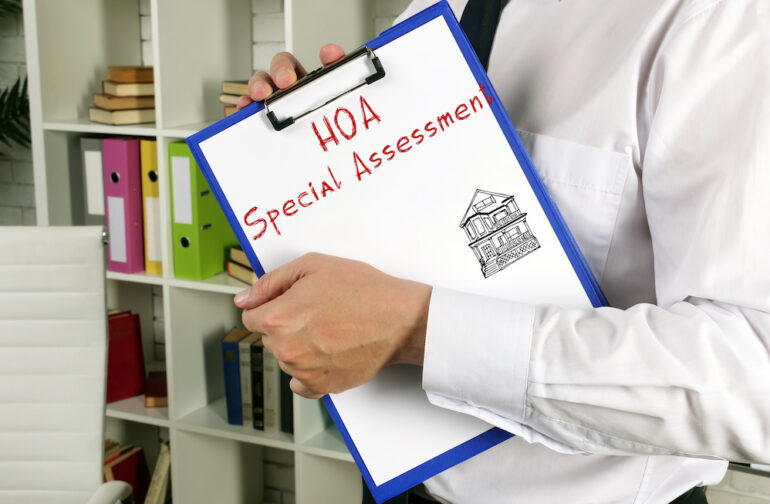If you live in a neighborhood governed by a homeowners association (HOA), you may receive a notice of special assessment at some point. The price tag can be a shocker! What is an HOA special assessment? Are you obligated to pay for it?
Understanding the HOA
When you choose to live in a neighborhood with an HOA, you agree to abide by its rules and regulations, known as conditions, covenants, and restrictions (CC&Rs). These legally binding rules govern your behavior as a resident and cover a wide range of topics, from home maintenance to using amenities. Understanding them is key to living harmoniously in your community.
The HOA has a board of directors made up of residents chosen by an annual neighborhood vote. The board makes decisions regarding the community’s needs and generally hires a management company to handle the day-to-day maintenance and upkeep of common areas such as swimming pools and the enforcement of the CC&Rs.
Regular dues and special assessments
The board has a fiduciary obligation to fairly assess regular dues to fund annual operations and provide reserves for future capital expenditures such as major repairs and upkeep of common area elements. Examples would be periodic draining and renovation of the community swimming pool or street repaving in a community without public roads.
To remain economically viable, it’s essential that a neighborhood maintain adequate funds in reserve. HOA boards contract with consulting firms to calculate future needed reserve amounts so that significant expenses are already built into the budget. This is a vital component of members’ annual dues. A too small reserve because of poor planning or underfunded dues frequently results in an HOA special assessment when a financial crisis occurs, such as an unanticipated or neglected repair of common areas. Special assessments can also be approved for reasons such as:
- Upgrades or additions to amenities that were not previously planned.
- Unusually high delinquencies of regular dues.
- Discovering that insurance coverage for property or liability damages is inadequate.
When the board needs to impose an HOA special assessment, it divides the costs among the community’s members and authorizes the management company to send a special assessment notice to members.
Rules and Remedies
The CC&Rs and state law generally stipulate rules for HOA special assessments. For example, both sets of governing regulations may stipulate that most neighborhood members must approve special assessments. They may also impose a cap on the amount of a special assessment, such as no more than five percent of the HOA’s annual operating budget.
Members should be allowed to meet with the HOA board to discuss the assessment and seek redress if it is in error or fails to comply with the CC&Rs or state regulations. The board should also be willing to negotiate with members who cannot pay the amount in a lump sum and work out agreeable terms for all parties.
If you cannot or refuse to pay the special assessment, the HOA has enforcement mechanisms at its disposal, such as fines and/or the suspension of member privileges and use of amenities. The HOA can also file a lien on your property and, in some states, seize your home and foreclose. Because failing to pay a special assessment can have serious legal and financial consequences, it’s best to work out a payment plan with the HOA if you cannot pay the special assessment in full.
Related – How to Interact with Your Homeowners Association


